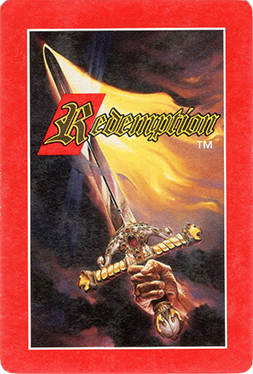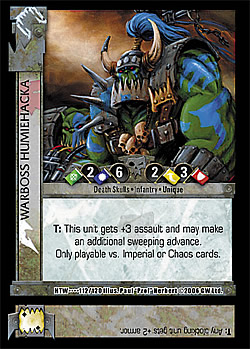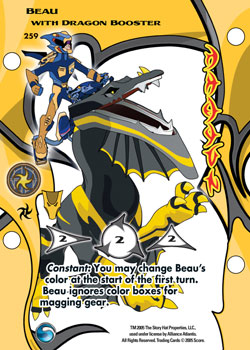Star Wars: Customizable Card Game (SW:CCG) is an out-of-print customizable card game based on the Star Wars fictional universe. It was created by Decipher, Inc., which also produced the Star Trek Customizable Card Game and The Lord of the Rings Trading Card Game. The game was produced from December 1995 until December 2001. Since 2002, the game has been maintained by the Star Wars CCG Players Committee, with new virtual cards being released every few months and the capability to play both in person and online.

A Game of Thrones: The Card Game is an out-of-print collectible card game produced by Fantasy Flight Games. It is based on A Song of Ice and Fire, a series of novels written by George R. R. Martin. The first set was Westeros Edition and was released in August 2002. It has since won two Origins Awards. The game's primary designer is Eric Lang, the lead developer is Nate French, with Damon Stone serving as associate designer.

The Yu-Gi-Oh! Trading Card Game is a collectible card game developed and published by Konami. It's based on the fictional game of Duel Monsters created by manga artist Kazuki Takahashi, which appears in portions of the manga franchise Yu-Gi-Oh! and is the central plot device throughout its various anime adaptations and spinoff series.

WarCry is an out-of-print collectible card game set in the world of Warhammer Fantasy and published by Sabertooth Games. The base game cards were released in 2003, with newer expansions introduced in the months since. A video game adaptation, titled Warhammer: Battle for Atluma, was created for the PSP in 2006.
Vampire: The Eternal Struggle is a multiplayer collectible card game published by White Wolf Publishing. It is set in the World of Darkness and is based on the Vampire: The Masquerade roleplaying game.

The Duel Masters Trading Card Game is a two-player or two vs. two team collectible card game (CCG) jointly developed by Wizards of the Coast and Takara Tomy. The card game is part of the Duel Masters franchise.

Killer Bunnies and the Quest for the Magic Carrot is a noncollectible card game created by Jeff Bellinger and graphic design/illustrations by Jonathan Young. Some early artwork for the game was also done by "Alex" Alexander, although credit for his contributions are not generally recognized. It is published by Playroom Entertainment.

Redemption is a collectible card game based on the Bible. It involves Biblical characters, places, objects, and ideas. The object of the game is for players to use their Heroes to rescue Lost Souls by defeating their opponent's Evil Characters, with the first player to rescue five Lost Souls winning the game. Redemption was first published in July 1995 by Cactus Game Design and its creator, Rob Anderson, continues to develop and produce the game and is the final authority on rulings.

Dragon Ball Z Trading Card Game is an out-of-print trading card game based on the Dragon Ball series created by Akira Toriyama. The game was produced by Score Entertainment and uses screen captures of the anime to attempt to recreate the famous events and battles seen in the anime. Score then sold the rights to Panini which eventually ceased publishing.

Daifugō or Daihinmin, also known as Tycoon, is a Japanese shedding-type card game for three or more players played with a standard 52-card pack. The objective of the game is to get rid of all the cards one has as fast as possible by playing progressively stronger cards than those of the previous player. The winner is called the daifugō earning various advantages in the next round, and the last person is called the daihinmin. In that following round, winners can exchange their one or more unnecessary cards for advantageous ones that losers have.

Horus Heresy is an out-of-print collectible card game originally produced in 2003 by Sabertooth Games. The game is set in the Warhammer 40,000 fictional universe developed by parent company Games Workshop. It attempts to recreate the struggle between the Loyalist forces of the Emperor of Mankind and the Traitor forces of Warmaster Horus, during the civil war known as the Horus Heresy. The game's development and sale by the publisher were discontinued in 2008, following financial difficulties at the parent company.

Dark Millennium is an out-of-print collectible card game. It's the successor to the Horus Heresy and set in the fictional Warhammer 40,000 universe. The base card set was launched in October 2005 by Sabertooth Games.

The Dragon Booster Trading Card Game is an out-of-print collectible trading card game based on the animated television series Dragon Booster. The initial card set, Release the Dragon, was released in February 2005 by Score Entertainment.

Yu-Gi-Oh! Worldwide Edition: Stairway to the Destined Duel, later released in Japan as Yu-Gi-Oh! Duel Monsters International is a Game Boy Advance game based on the popular Yu-Gi-Oh! trading card game and TV series that has the player set during the Battle City arc, dueling popular characters from the anime and manga. The main objective of the game is to build a strong deck from cards won after duels from the main cast from the English second season anime.

The Bleach Trading Card Game is an out-of-print collectible card game from Score Entertainment, and is based on the manga and anime series of the same name. The game received a nomination for Origin's "Game of the Year" and earned a semi-finalist position.
Star Wars PocketModel Trading Card Game is an out-of-print tabletop game manufactured by WizKids, Inc. that debuted in 2007, based on the Star Wars universe. The game was designed by Mike Elliott and Ethan Pasternack.

Chaotic is an out-of-print Danish collectible card game brought to the United States by Chaotic USA and 4Kids Entertainment, and distributed by TC Digital Games. It was released along with the open beta version of the online game on October 24, 2007. The card game is also featured in the animated series of the same name. As of 2014, the website is currently closed and the cards are no longer in production.

Battlestar Galactica Collectible Card Game is an out-of-print collectible card game based on the Battlestar Galactica science fiction media franchise. The game, published by WizKids, saw first release in May 2006 and was officially canceled in March 2007.

A digital collectible card game (DCCG) or online collectible card game (OCCG) is a computer or video game that emulates collectible card games (CCG) and is typically played online or occasionally as a standalone video game. Many DCCGs are types of digital tabletop games and follow traditional card game-style rules, while some DCCGs use alternatives for cards and gameboards, such as icons, dice and avatars. Originally, DCCGs started out as replications of a CCG's physical counterpart, but many DCCGs have foregone a physical version and exclusively release as a video game, such as with Hearthstone.

The Final Fantasy Trading Card Game, often abbreviated as Final Fantasy TCG or FF-TCG, is a trading card game developed by Hobby Japan and published by Square Enix. The first iteration was released in Japan in 2011 but never released outside Japan and was discontinued in order to release a second iteration worldwide in October 2016.

















